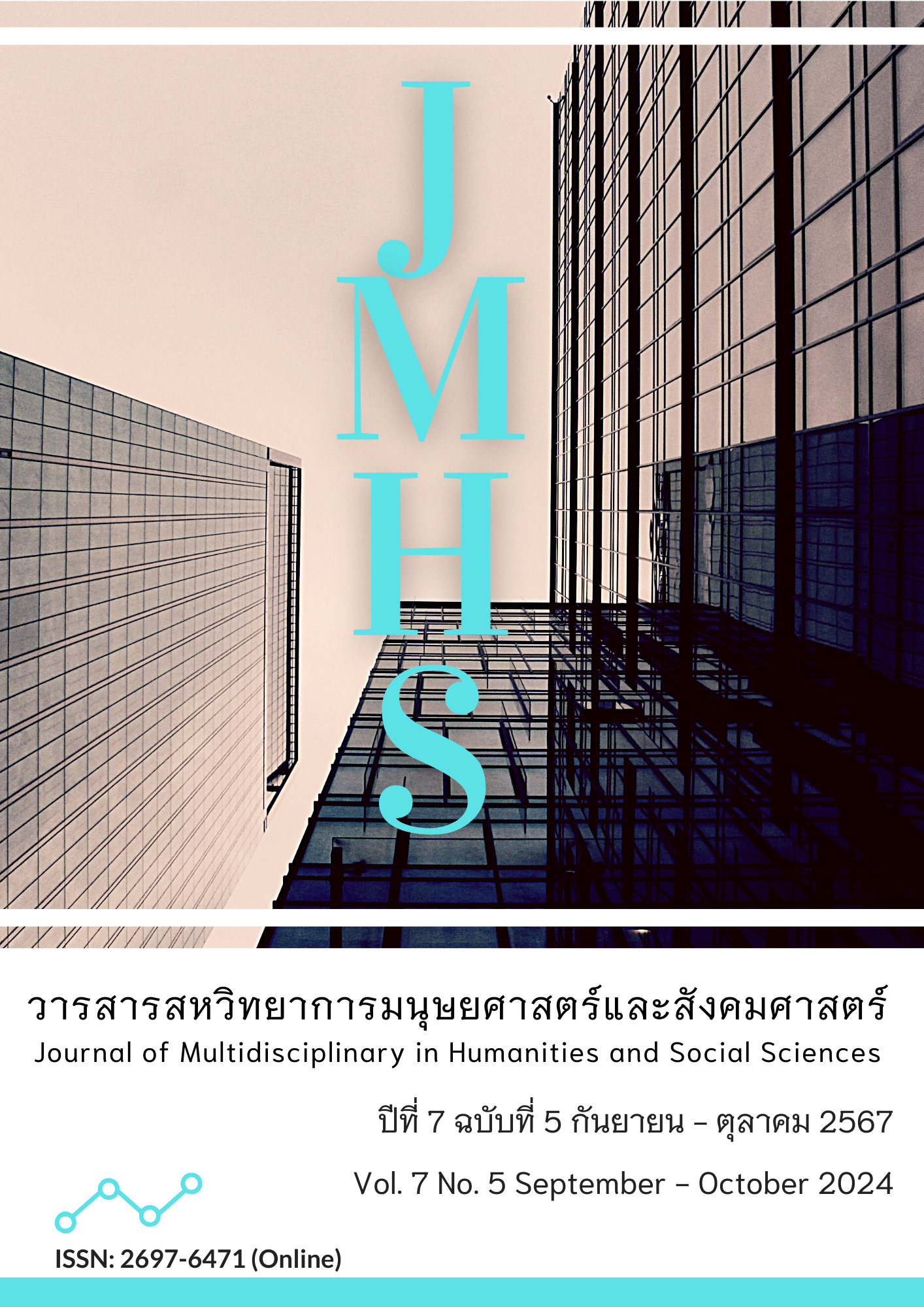มุมมองการแก้ไขปัญหาความยากจนภาคเหนือประเทศไทย จากนโยบายการออกไปนอกประเทศขององค์กรพัฒนาเอกชนนานาชาติจีน
Main Article Content
บทคัดย่อ
บทความฉบับนี้เป็นการศึกษานโยบายการออกไปนอกประเทศของจีน กับการพัฒนาในภาคเหนือของไทย โดยผ่านองค์กรพัฒนาเอกชนไฮฮุย ประเทศจีน ที่เข้ามาดำเนินงานพัฒนาในประเทศไทยเพื่อช่วยขจัดความยากจน ส่งผลต่อการพัฒนาชุมชนในภาคเหนือของประเทศไทย โดยรวบรวมข้อมูลจากการสังเกตการณ์อย่างมีส่วนร่วม สัมภาษณ์เชิงลึกกับกลุ่มคนที่ได้รับการช่วยเหลือด้านการพัฒนา แบ่งเป็นสามกลุ่ม คือ 1) กลุ่มนักศึกษา 2) กลุ่มนักเรียน และ 3) ชาวบ้านในชุมชน ทั้งนี้ ได้นำแนวคิดการพัฒนาและแนวคิดอำนาจละมุนมาใช้เป็นกรอบในการวิเคราะห์ ซึ่งการศึกษานี้มีคาถามหลัก 3 คำถาม คือ 1) พัฒนาการและการทำงานขององค์กรไฮฮุย ในประเทศไทย สัมพันธ์กับแนวคิดและนโยบายของรัฐบาลประเทศจีนอย่างไร และมีบทบาทในการสร้างความสัมพันธ์ระหว่างจีน-ไทย อย่างไร 2) บทบาทการทำงานขององค์กรไฮฮุย ในประเทศไทยสัมพันธ์กับแนวคิดการพัฒนาในการขจัดปัญหาความยากจนในประเทศจีนอย่างไร และ 3) ชาวบ้านในชุมชนชาติพันธุ์ที่เป็นผู้ได้รับการพัฒนาจากองค์กรไฮฮุย มีบทบาทและความคิดเห็นอย่างไร
ผลการศึกษาพบว่า การขยายตัวของความช่วยเหลือด้านการพัฒนาในต่างประเทศของจีน สะท้อนให้เห็นถึงการเติบโตของการลงทุนทางธุรกิจของจีน สะท้อนให้เห็นในนโยบาย “ออกไป” ของแผนห้าปีที่ 10 ของจีน (พ.ศ. 2544-2548) ซึ่งตรงกันข้ามกับแนวทางปฏิบัติหลักของผู้บริจาคชาวตะวันตก โดยความช่วยเหลือจากจีนส่วนใหญ่เป็นการให้ ในรูปแบบของเงินกู้แบบผ่อนปรนหรือดอกเบี้ยต่ำ และบางส่วนเป็นโครงการก่อสร้างโครงสร้างพื้นฐานที่ได้รับทุนสนับสนุนจากรัฐบาลหรือรัฐบาลอุดหนุน
บทความนี้มุ่งค้นหาความหมายแฝง ของการมีส่วนร่วมขององค์กรพัฒนาเอกชนในความช่วยเหลือ ด้านการพัฒนาระหว่างประเทศของจีนในอนาคต และคำอธิบายเชิงทฤษฎีว่า ทำไมองค์กรพัฒนาเอกชนของจีนที่เติบโตไปทั่วโลก เป็นการแสดงให้เห็นอย่างชัดเจนถึงอำนาจละมุน ที่องค์กรไฮฮุยประเทศจีน เข้ามาประเทศไทยเพื่อช่วยแก้ปัญหาและขจัดความยากจนของชุมชน โดยทำงานแบบมีความร่วมมือกับองค์กรพัฒนาเอกชนของประเทศไทย สร้างเวทีเพื่อแลกเปลี่ยนพูดคุยและเชื่อมโยงทรัพยากรของจีนต่าง ๆ เข้าไปดำเนินแก้ปัญหาและเปลี่ยนวิถีชีวิตของชุมชน
Article Details

อนุญาตภายใต้เงื่อนไข Creative Commons Attribution-NonCommercial-NoDerivatives 4.0 International License.
ทัศนะและความคิดเห็นที่ปรากฏในวารสาร ถือเป็นความรับผิดชอบของผู้เขียนบทความนั้น และไม่ถือเป็นทัศนะและความรับผิดชอบของกองบรรณาธิการ
เอกสารอ้างอิง
ชัชวาลย์ ทองดีเลิศ. (2543). บันทึกลับ NGO: กำเนิดและพัฒนาการขององค์กรพัฒนาเอกชนภาคเหนือ. เชียงใหม่: มูลนิธิพัฒนาภาคเหนือ.
ธนกร วรพิทักษานนท์. (2566). สนามสังคมข้ามพรมแดนกับการแสวงหาโอกาสทางเศรษฐกิจของชาวจีนอพยพรุ่นใหม่และผลกระทบด้านความมั่นคงในกรุงเทพมหานคร. วารสารวิจยวิชาการ, 6(3), 359-376. สืบค้นจาก https://so06.tci-thaijo.org/index.php/jra/article/view/260201
นภาพร อัศวะรังษีกุล. (2562). ปัญหาของกลุ่มชาติพันธุ์ในประเทศไทย: อัตลักษณ์ทางวัฒนธรรมที่เปลี่ยนแปลง. ปทุมธานี: คณะศิลปศาสตร์ มหาวิทยาลัยรังสิต.
ศิริลักษม์ ตันตยกุล. (2561). บทบาทคลังสมองในกระบวนการกำหนดนโยบายสาธารณะของจีน: กรณีศึกษาข้อริเริ่มแถบเศรษฐกิจและเส้นทางสายไหมยุคใหม่. กรุงเทพฯ: ศูนย์วิจัยยุทธศาสตร์ไทย-จีน.
สนธยา พลศรี. (2545). ทฤษฎีและหลักการพัฒนาชุมชน. กรุงเทพฯ: โอเดียนสโตร์.
อรัญญา ศิริผล. (2561). การเคลื่อนย้ายของคนจีนกับบทบาทรัฐจีนในศตวรรษที่ 21. ปทุมธานี: มหาวิทยาลัยธรรมศาสตร์.
Batley, R., & Rose, P. (2011). Analyzing Collaboration Between Non-Governmental Service Providers and Governments. Public Administration and Development, 31(4), 230-239.
Guo, Y., Zhou, Y., & Liu, Y. (2022). Targeted Poverty Alleviation and Its Practices in Rural China: A Case Study of Fuping County, Hebei Province. Journal of Rural Studies, 93, 430-440. https://doi.org/10.1016/j.jrurstud.2019.01.007
Hasmath, R., & Hsu, J. (2008). NGOs in China: Issues of Good Governance and Accountability. Asia Pacific Journal of Public Administration, 30(1), 29-39. https://doi.org/10.1080/23276665.2008.10779341
Ticktin, M. (2014). Transnational Humanitarianism. Annual Review of Anthropology, 43, 273-283. https://doi.org/10.1146/annurev-anthro-102313-030403
Wang, Y. (2023). Embeddedness Beyond Borders: Examining the Autonomy of Chinese NGOs in Their Global Endeavours. Journal of Current Chinese Affairs, 52(1), 3-24. https://doi.org/10.1177/18681026221110587
Yafei, C. (2013). Research on the Cooperation Between Chinese Government and NGO in Poverty Alleviation. Tianjin: China Social Sciences Press.
Yang, Z. (2022). Dunhuang’s Importance in China’s Diplomacy: An Identity That Stands with Time. International Journal of Education and Humanities, 4(3), 156-159. https://doi.org/10.54097/ijeh.v4i3.1798
Ying, L. (2013). Characteristics, Causes and Poverty Alleviation Strategies of Rural Poverty. People's Forum of China, 53, 2-15.


